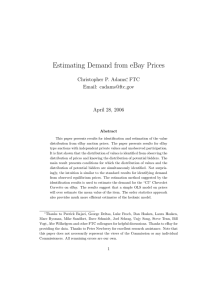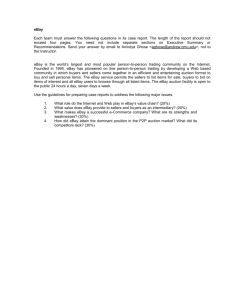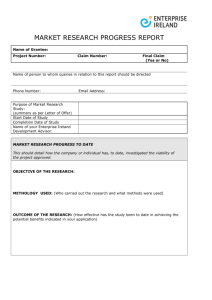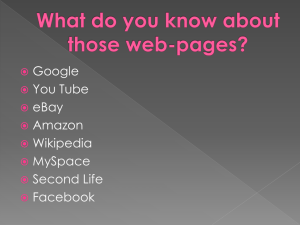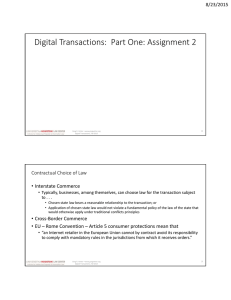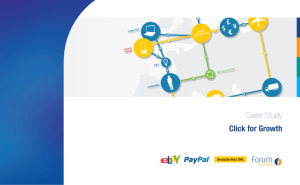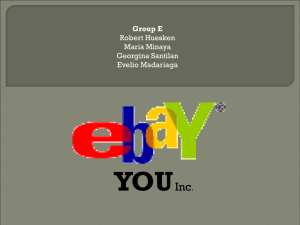Proposal evaluation form
advertisement
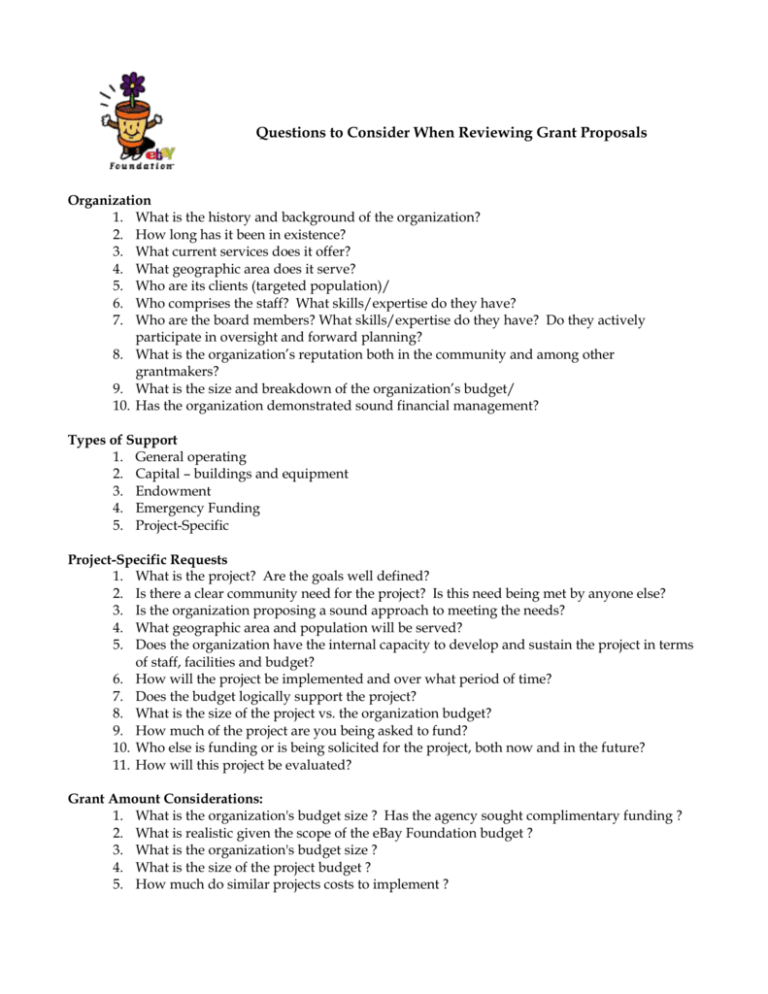
Questions to Consider When Reviewing Grant Proposals Organization 1. What is the history and background of the organization? 2. How long has it been in existence? 3. What current services does it offer? 4. What geographic area does it serve? 5. Who are its clients (targeted population)/ 6. Who comprises the staff? What skills/expertise do they have? 7. Who are the board members? What skills/expertise do they have? Do they actively participate in oversight and forward planning? 8. What is the organization’s reputation both in the community and among other grantmakers? 9. What is the size and breakdown of the organization’s budget/ 10. Has the organization demonstrated sound financial management? Types of Support 1. General operating 2. Capital – buildings and equipment 3. Endowment 4. Emergency Funding 5. Project-Specific Project-Specific Requests 1. What is the project? Are the goals well defined? 2. Is there a clear community need for the project? Is this need being met by anyone else? 3. Is the organization proposing a sound approach to meeting the needs? 4. What geographic area and population will be served? 5. Does the organization have the internal capacity to develop and sustain the project in terms of staff, facilities and budget? 6. How will the project be implemented and over what period of time? 7. Does the budget logically support the project? 8. What is the size of the project vs. the organization budget? 9. How much of the project are you being asked to fund? 10. Who else is funding or is being solicited for the project, both now and in the future? 11. How will this project be evaluated? Grant Amount Considerations: 1. What is the organization's budget size ? Has the agency sought complimentary funding ? 2. What is realistic given the scope of the eBay Foundation budget ? 3. What is the organization's budget size ? 4. What is the size of the project budget ? 5. How much do similar projects costs to implement ? 6. 7. 8. 9. 10. 11. What role does the eBay Foundation want to have in the project e.g. lead or sole supporter ? What other funding has been secured for the project ? What other funders are involved and at what level of support ? What are competitive company's giving for similar projects ? What are the benefits at each level of support ? Cost/benefit analysis ? Is the project consistent with eBay Foundation’s priority focus areas? 1. 2. 3. 4. Community Technology Community Economic Development Community Strengthening Community Participation Has the applicant clearly demonstrated need? 1. Is there pertinent data that support the need for the effort? Do the proposed programs address the need? 1. Are the programs consistent with the stated need? 2. Are the programs culturally proficient in meeting targeted populations? 3. Is the agency aware of similar efforts that could be potential partners? 4. Is the evaluation strategy consistent with the program objectives? Does the agency have the capacity to support the programs listed? 1. Is the agency fiscally sound? 2. Has the agency sought complimentary funding? 3. How will the project be supported past the original grant period? 4. Are the collaborative agreements clear as to who does what (if applicable)? 5. Does the agency have board and staff members that are familiar with the group and/or the area they are serving? ROPES TO SKIP AND ROPES TO KNOW: AN EXPERIENTIAL JOURNEY THROUGH THE BASICS SITE VISITS Karen Muller The essential elements: I. DO THEM! Why? Don’t consider site visits just an option in grant review. They are critical to complete the picture of the proposal. They help you understand the context of the organization and the program. They enhance the development of a community network. They indicate a greater personal concern and commitment by your organization to fully understand the program. They can change the power relationship – you are meeting on their turf, gaining from their expertise. You gain a clearer sense of the commitment and capacity of the organization, based on their people. They provide you the opportunity to gather all of the other information that you cannot get on paper. They establish a dialogue essential to the grantmaker’s education. They allow an opportunity for program and agency people to talk about things they would not necessarily commit on paper. II. BE PREPARED Read the proposal in advance. Have a list of questions. Avoid asking questions that the proposal has answered, unless there is a need for greater clarification. Demonstrate that you have read the proposal, not just by saying you have, but also by referring to it and demonstrating some understanding. This shows respect for their efforts in putting it together and shows that you have taken time with it. III. BE FLEXIBLE ABOUT THE SITE VISIT The best time to see the program in action may not be the most convenient time for you. Let the organization help you plan the site visit. Ask them what they think would give you the best sense of their organization and program. IV. SET A NON-THREATENING ATMOSPHERE These are not “site inspections.” The more comfortable the interview and conversation, the more you will learn about the organization, the people, and their expertise on community issues. V. INCLUDE IN THE SITE VISITS THE PARTICIPATION OF A BOARD MEMBER AND PROGRAM PEOPLE, IF POSSIBLE, NOT JUST THE EXECUTIVE DIRECTOR AND DEVELOPMENT PERSON. Involvement of board members gives you the opportunity to learn how the board functions and assess its level of understanding of the program and organizations. Program people clearly know the nuts and bolts of the organization’s efforts. VI. FORWARN THE ORGANIZATION IF YOU HAVE SPECIFIC FINANCIAL QUESTIONS OR NEED ADDITIONAL MATERIALS It is plain courtesy to allow the organization the opportunity to be prepared for your site visit. SOME QUESTIONS TO ASK: 1. “Tell me a success story.” This question provides insights into how the organization measures their success. 2. “Whom do you refer to on this particular issue?” This allows you to broaden your network of people who are knowledgeable on a particular program or community issue, and to determine to what extent the agency and its program people reach out beyond their own expertise. 3. “Tell me what you see as the new trends or movement in your field.” Grant Evaluation Two Types of Evaluation: Formative (Process) – Did the grantee do what they said they would do? For example, numbers of clients served, curriculum developed, program piloted, homeless beds provided. Summative (Outcome) – What impact did the grantee achieve? What changed for the clients? Community? Suggestions If there is an established grant agreement letter and companion grant agreement on what is to be accomplished in a given time period, review progress against such documents. First, check to see if grant reports were received. Utilize information gained through the grant process and arrive at a “So what?” A nonprofit agency can report stories of the impact of the program on the lives of participants of the program – how their lives were changed and how a particular grant contributed to that change. For larger grants a basic formative process could be conducted around some specific, SIMPLE activity goals to monitor the agency performance against these measures e.g. x are enrolled in a program, y complete the program, z% demonstrate increased skills, etc. Check to see if an organization has hit these milestones or benchmarks. Things you might want to ask a grantee to answer include: Specify your accomplishments towards meeting the stated objectives. Describe the qualitative and quantitative measurements used to determine the success or effectiveness of your work. Include numbers of clients served and other data to support outcomes. Specify what impact you think the program made on individuals or the community. Describe how this program will be continued after EBay’s funding ends. Describe what you’ve learned from this program. Evaluation Limitations of Grants: Time Limitations – you need more than one year of data to ensure that the intervention was the driving force in the change and that gains “hold” or are stable over time. Cost Constraints – the services of an evaluation consultant can be prohibitive. Agencies are hampered with limited dollars for evaluation of programs and cannot afford the expertise of professional evaluation consultants. For a grant of under $10,000, there should be little expectation that the agency can tailor an evaluation analysis for a specific grant. For example, if you hire a consultant, one should expect to pay a minimum of $5k. A general rule of thumb is 12-15% of program budget for evaluation (with a minimum of $5k). On a $25k grant, this would mean that 15% is $3,750. The $5k min. is REALLY a 20% factor of budget. This is often unrealistic.
